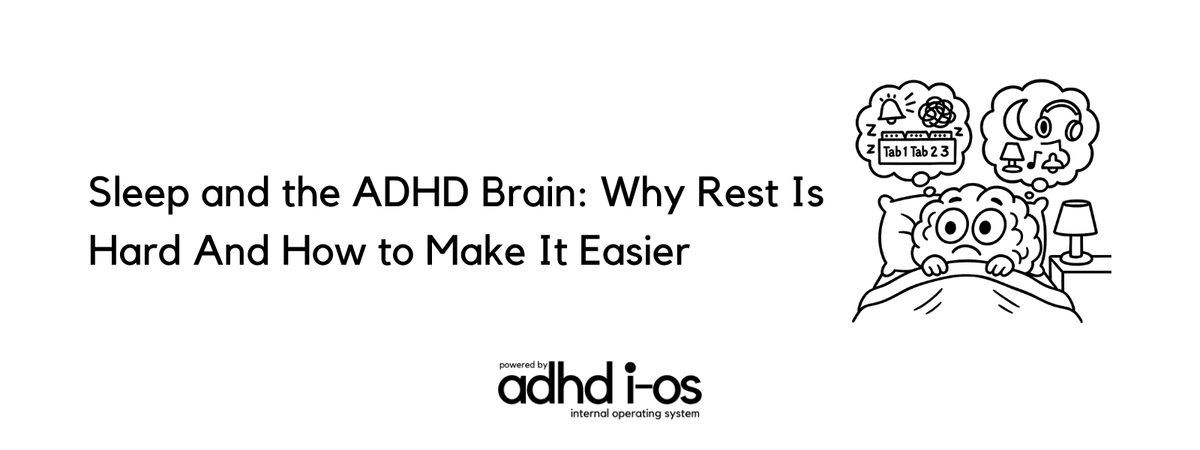Sleep and the ADHD Brain: Why Rest Is Hard And How to Make It Easier
Sleep and the ADHD Brain: Why Rest Is Hard And How to Make It Easier
Sleep and the ADHD Brain: Why Rest Is Hard And How to Make It Easier
Ever feel more awake the later it gets?
Or like your brain finally powers on right when the world wants you to shut down?
You’re not alone. For ADHD brains, sleep struggles aren’t just a bad habit or lack of willpower. They’re deeply wired into how our brains process stimulation, reward, and regulation. That frustrating cycle of tired-but-can’t-sleep has a neurological explanation.
Let’s dig into why sleep is so slippery with ADHD, and how you can support your brain to finally rest.

Why Sleep Feels So Hard with ADHD
You’re exhausted. But the moment you try to rest, your brain lights up. Thoughts race, your body feels unsettled, and before you know it, it’s 2AM and you’re deep in a YouTube spiral.
This isn’t just frustrating…it’s incredibly common.
“Up to 75% of adults with ADHD report chronic sleep problems.”
Sleep Foundation
Some of the most common ADHD-related sleep struggles include:
- Nighttime energy spikes (your brain suddenly comes alive)
- Racing thoughts and restless bodies
- Difficulty shifting from stimulation to stillness
It’s not a moral failing. It’s neurology.
What’s Going on in the Brain?
Many ADHDers experience something called Delayed Sleep Phase Syndrome. That is, your brain’s internal clock is shifted later.
- Melatonin (the sleep hormone) kicks in hours after it should
- You feel most alert when others are winding down
Dopamine and Cortisol Loops
Low dopamine during the day can make your brain seek stimulation at night, creating a kind of overstimulation loop when you need to wind down.
- ADHD brains often have irregular dopamine and cortisol signaling
- This disrupts natural sleep/wake patterns
Executive Dysfunction
Planning bedtime sounds easy, until you have to actually do it.
- Transitions from tasks to rest are harder
- Weak time awareness makes it difficult to maintain routines
Common Sleep Challenges for ADHD Brains
- Trouble falling asleep (aka sleep onset insomnia)
- Waking throughout the night or sleeping in but feeling unrested
- “Revenge bedtime procrastination” or delaying sleep for screen time or hyperfocus
- Overstimulation from tech, thoughts, or tasks
Knowing what’s happening makes it easier to respond with compassion and tools.
Brain-Friendly Sleep Strategies
Strategy - Consistent Wake Time
Why It Works - Anchors your circadian rhythm even if bedtime shifts
Strategy - Wind-Down Routine
Why It Works - Sends repetitive cues to your brain: we're powering down now
Strategy - Digital Deceleration
Why It Works - Screens = stimulation. Cutting them early gives your brain time to settle
Strategy - Red/Dimming Lights
Why It Works - Supports melatonin flow and helps reset your biological “night mode”
Strategy - Body-Based Grounding
Why It Works - Breathing, stretching, or somatic tools help regulate the nervous system
Strategy - Sleep Delay Buffer
Why It Works - Build in 30–60 min of low-stimulation time between your last task and sleep
Need to see it? Picture a visual checklist with icons: red lamp, eye mask, gentle stretch, “phone off” toggle.
Clinical Supports & Tools That Can Help
If lifestyle shifts aren’t enough, there are brain-backed supports to explore:
- Melatonin supplements (short-term use; talk to a provider first)
- CBT-I (Cognitive Behavioral Therapy for Insomnia) specifically adapted for ADHD
- Sleep tracking apps: Oura Ring, Sleep Cycle, Hatch, Insight Timer
- Environmental supports: blackout curtains, pink/white noise, weighted blankets
Bottom Line: It’s Not You. It’s Your Brain.
Sleep doesn’t come easily for many ADHDers, and that doesn’t mean you’re broken. It means your brain needs different conditions to wind down.
The more you understand what’s happening biologically, the easier it becomes to design your environment and routines in a way that actually works with your brain, not against it.
Try This Tonight
Pick one brain-friendly shift from this post. Maybe dim your lights earlier, or try a wind-down ritual that signals “bedtime mode.”
Then, let your brain practice falling asleep. It’s a skill, and one you can support over time.
Want more science-backed ADHD strategies that get how your brain really works?
Join the adhd i-os community, where we turn neuroscience into real-world support for neurodivergent humans.
No shame. Just smart tools, supportive insights, and people who get it.

